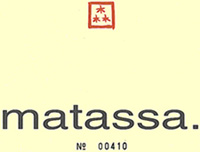2007 vintage verbatim: Tom Lubbe on biodynamics
 Tom Lubbe, a biodynamic vigneron in Roussillon who hails originally from South Africa, writes in responding to the statement, “We’ll see who are the real biodynamic producers this year. If they’re really biodynamic, this year they won’t have any wine.” I tasted Tom’s excellent old-vine Grenache called Matassa earlier this year. To his email:
Tom Lubbe, a biodynamic vigneron in Roussillon who hails originally from South Africa, writes in responding to the statement, “We’ll see who are the real biodynamic producers this year. If they’re really biodynamic, this year they won’t have any wine.” I tasted Tom’s excellent old-vine Grenache called Matassa earlier this year. To his email:
This is the kind of lunatic (no positive connection to lunar cycles) assertion that the Bordelais, or those who spend too much time in the environs, are prone to making. A difficult vintage should have no bearing on the basis of your cultural method in the vineyard. The assumption that no “truly” biodyamic (and organic?) vigneron could make wine in 2007 shows a paucity of comprehension for what biodynamics (and organics?) actually entails and the multiple benefits that issue from a more holistic, natural approach to viticulture. A naturally farmed vineyard’s ability to resist pathogens is dependent on the condition of the soil. If the soil is alive with a rich diversity of microbial activity (and the oft forgotten earthworm) the vineyard’s resistance to disease is naturally stronger , much like the bacteria we need in our gut . In fact, the real grape when fighting off pathogens such as oidium or downy mildew without the interference of systemic chemicals produces increased levels of polyphenols, which as we now know affect not just taste but our health and nutrition as well. In real wine I like to think these three elements (taste, nutrition and health) are as intimately linked as they are in real food.
Indeed, if a vigneron labours through the years to regenerate a living soil and still cannot take in a reasonable harvest this would be a sure sign that they are working a mediocre terroir for grapes and they should either relocate their viticultural efforts or plant rice. That Bordeaux was originally a swamp developed by the English and Dutch, two essentially mercantile/military nations with insatiable thirsts for cheap booze, does come to mind when regarding the nature and frequency of bad vintages in Bordeaux. (Does M. Rolland do sake?) Kampai, Tom
Related: “Green wine: the zen forest of Matassa, Roussillon”
“2007 vintage verbatim: Nicolas Joly on biodynamics“




On October 25th, 2007 at 10:22 am ,Doug Smith wrote:
Tom Lubbe makes a number of unsubstantiated claims about organic and biodynamic agriculture. To start with, there is no evidence that organic agriculture is any more nutritious for you than conventionally farmed agriculture. Responsible organs such as Consumer Reports suggest instead that organic products are better because “a growing body of research shows that pesticides and other contaminants are more prevalent in the foods we eat, in our bodies, and in the environment than we thought. And studies show that by eating organic foods, you can reduce your exposure to the potential health risks associated with those chemicals.”
http://www.consumerreports.org/cro/food/diet-nutrition/organic-products/organic-products-206/overview/index.htm
However, if as we saw with Joly’s information yesterday, biodynamic viticulturalists are also prone to use extremely toxic fungicides like copper sulfate, this diminishes somewhat the claim that they produce fungicide-free food.
A 2007 paper by Primoz Plahuta and Peter Raspor from Food Control, compared possible health risks involved in organic, biodynamic and GMO wine. Their risk assessment finds that biodynamic wines contain potentially the most health risks of all. Partly this is because of the risk of mycotoxins from fungi. These could be alleviated, of course, by use of fungicides, but there is a tradeoff. The point here is that by minimizing the use of fungicides, they raise the risk of including mycotoxins in the finished wine. Plahuta and Raspor also believe that organic and biodynamic winemaking may allow other toxins in the winemaking process.
Lubbe makes the point in his letter that soils rich in earthworms may help plants’ disease fighting capabilities. If you check my response to Joly yesterday, copper sulfate is a powerful killer of beneficial biota such as earthworms. So I don’t entirely see how Lubbe’s point is consistent with Joly’s use of copper sulfate in his vineyards.
On October 26th, 2007 at 8:54 am ,Alice Feiring wrote:
Doug, Consumer Reports? Come on. and Food Control? Who’s Food Control, the governments? That nortoriously off-the-mark- organization that has given us great outbursts of salmonella and taken away helpful bacteria in cheese? Come on.
Am curious why you come out swinging on all of this. Could you reveal who you are and your investment in all of this?
On October 26th, 2007 at 10:41 am ,Doug Smith wrote:
Alice: Food Control is a peer-reviewed scientific journal devoted to food safety. Here is a link to the abstract of the article:
http://www.sciencedirect.com/science?_ob=ArticleURL&_udi=B6T6S-4JBGHYN-1&_user=10&_coverDate=05%2F31%2F2007&_rdoc=1&_fmt=&_orig=search&_sort=d&view=c&_acct=C000050221&_version=1&_urlVersion=0&_userid=10&md5=c8e980e5dd12f0327fed563800630c36
And Consumer Reports is about the most objective public organ you are going to find on these matters. They are financially beholden to nobody.
I am not claiming any of this is the final word, however. No one article or viewpoint should be taken as such. (The article in Food Safety is thought-provoking, but probably needs more work). And for what it’s worth I do not have any pecuniary or financial investment in any of this. I do not work in the wine industry or in agriculture. But I am concerned with the amount of misinformation out there being distributed about biodynamic agriculture and winemaking, particularly in the popular press. It appears to me to be marketing based partly on false advertising.
If you are interested, we have articles about this in World of Fine Wine and Skeptical Inquirer magazine. The article from WFW can be accessed at the URL here:
http://www.finewinemag.com/index.php?action=page&p=join_the_debate&postid=5#post
It’s over on the right hand side.